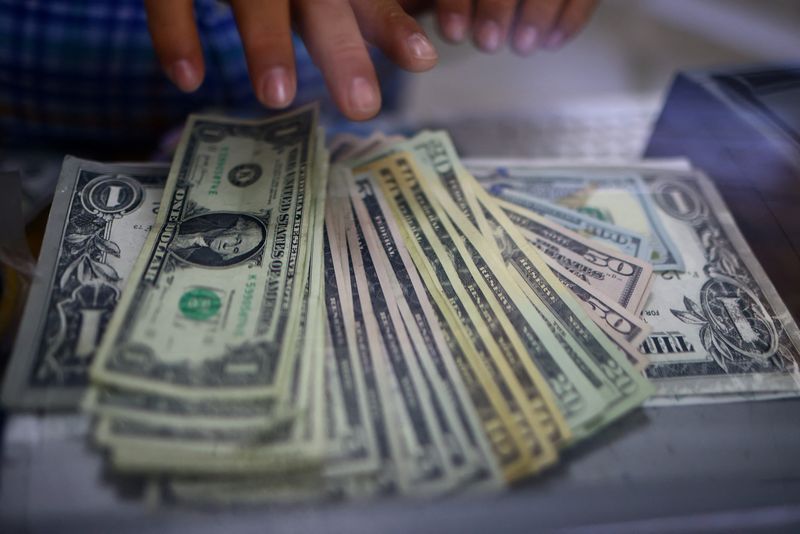
By Ankur Banerjee
SINGAPORE (Reuters) -The dollar inched higher and held close to a two-week high on Tuesday as investors geared up for a slew of economic data, including Friday’s U.S. payrolls, that could influence the size of an expected interest rate cut from the Federal Reserve.
The euro was 0.16% lower at $1.1055, not far from the two-week low of $1.1042 it touched in the previous session, while sterling eased 0.17% to $1.3124.
That left the dollar index, which measures the U.S. currency against six rivals, 0.11% higher at 101.77, just shy of the two-week high of 101.79 it touched on Monday. The index fell 2.2% in August on expectations of U.S. rate cuts.
Investor focus this week will squarely be on the U.S. payrolls data due on Friday after Fed Chair Jerome Powell last month endorsed an imminent start to interest rate cuts in a nod to the worries over the labour market.
Ahead of that, job openings data on Wednesday and the jobless claims report on Thursday will be in the spotlight.
Markets are pricing in a 69% chance of a 25 basis points (bps) cut when the Fed meets on Sept. 17-18, with a 31% probability of a 50-bps cut, CME FedWatch tool showed.
This week’s overload of labour data will be crucial in breaking the debate between a 25- or 50-bps cut in September, said Charu Chanana, head of currency strategy at Saxo.
“If the data remains robust, a 25 bps cut is more likely. However, a weak non-farm payrolls, particularly if it falls below 130,000 with another jump higher in unemployment rate, could push the rates market closer to pricing a 50 bps cut”
Economists surveyed by Reuters expect the addition of 165,000 U.S. jobs in August, up from an increase of 114,000 in the previous month.
Win Thin, Brown Brothers Harriman’s global head of market strategy, said data last week confirmed what markets already knew. “That is, the U.S. economic growth remains robust, driven by strong consumption, even as disinflation continues slowly but surely.”
Data on Friday showed personal consumption expenditures (PCE) price index – Fed’s preferred measure of inflation – rose 0.2% in July, matching economists’ forecasts, keeping the U.S. central bank on the path to cut rates.
“We are in a Goldilocks moment right now and so we continue to believe the Fed will start cutting rates this month in a very gradual manner,” Thin said in a note.
Markets, though, anticipate 100 bps of cuts from the remaining three meetings this year.
Ten-year Treasury yields were little changed at 3.915% as trade resumed in Asia following a U.S. holiday on Monday.
Elsewhere, the yen fetched 146.50 per dollar, up 0.3% on the day but still close to the two-week low of 147.16 hit on Monday.

Analysts said the yen moves was likely just an unwind of Monday’s drop when U.S. markets were closed leading to thin liquidity and sudden moves.
The Australian dollar fell 0.8 to $0.6737, ahead of the gross domestic product (GDP) report due on Wednesday, after rising 3.5% in August. The New Zealand dollar slipped 0.75% to $0.61875, having surged 5% last month. [AUD/]
This post is originally published on INVESTING.





